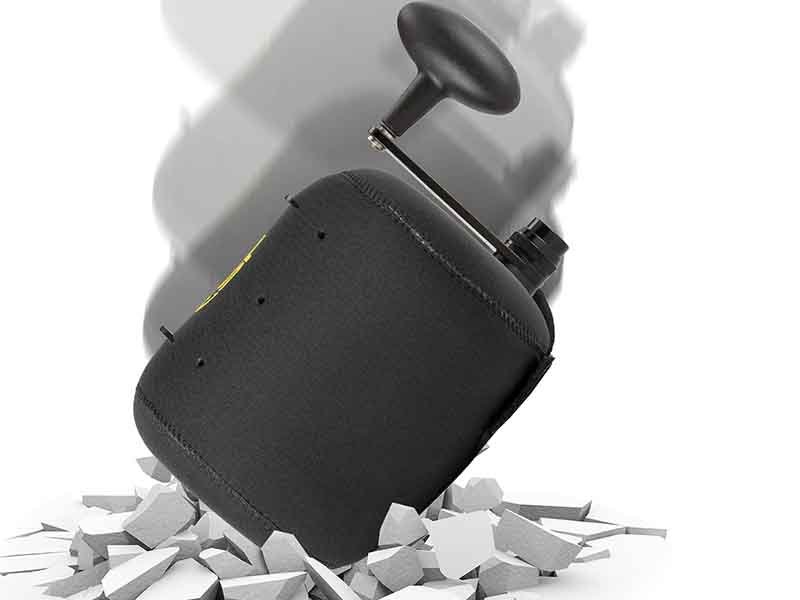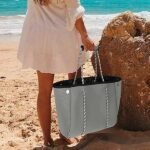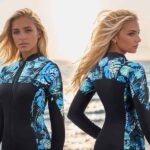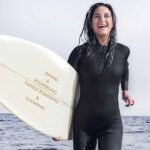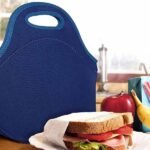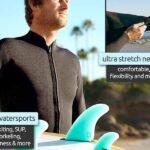Picture this: you’re on the water at dawn, packing up your gear after a long day of casting under sun, salt, and spray. You reach for your prized reel—only to find scratches, grit lodged in the gears, maybe a bit of corrosion setting in. Frustrating, right? That’s exactly where neoprene fishing reel covers come in, offering that soft but tough protective hug that keeps your investment in top shape, trip after trip. Not just an accessory—they’re peace of mind wrapped in super comfy neoprene.
Neoprene fishing reel covers are made from water-resistant, shock-absorbing neoprene and designed to shield your reels from scratches, dust, saltwater and bumps. They slide on snugly—often without removing your reel from the rod—and prevent damage during transport or storage, giving you durability and long-term gear protection in one sleek package.
Now imagine customizing that little piece of protection—as a brand, retailer, or outdoor gear wholesaler—with your logo, colors, and packaging. That’s where Szoneier steps in. With 18+ years in neoprene OEM/ODM, we craft personalized, high-quality covers with free design, low MOQ, fast samples, and reliable delivery. Curious to see how that works? Stick around—we’ll walk you through materials, styles, comparisons, and exactly how to order.
What Are Neoprene Fishing Reels Covers Made Of and How Do They Work?
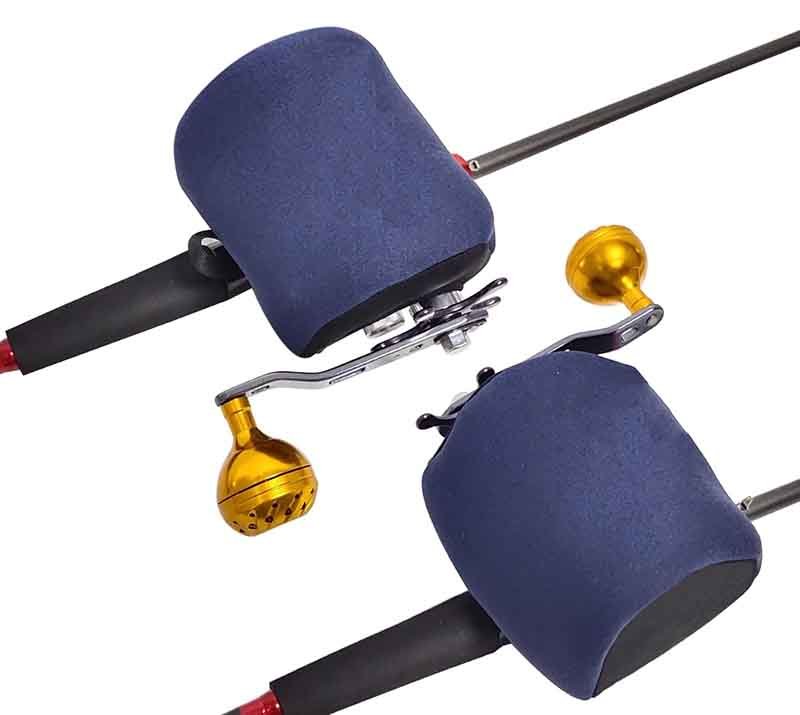
Neoprene reel covers are crafted from thick, flexible, and water-resistant neoprene—often 2–5 mm thick—with reinforced stitching and closures like Velcro. They snugly wrap around reels (even left on the rod), shielding gears from saltwater corrosion, dust, scratches, and shock during transit or storage.
Neoprene, originally developed for NASA in the 1930s, is a synthetic rubber prized for its flexibility, water resistance, and cushioning effect. For reel covers, this material acts much like a wetsuit for your fishing gear—thick enough (typically 2 mm to 5 mm) to abrade-proof yet soft enough to fit compactly without compromising ergonomic handling.
Take, for instance, PENN’s spinning reel covers—they use 5 mm thick neoprene and triple-stitched seams, ensuring longevity and tear resistance under rugged use . On the other hand, brands like Abu Garcia opt for slimmer 2 mm neoprene that allows anglers to leave the reel mounted on the rod—quick and fuss-free. Differences like these cater to varied needs: thicker for heavy-duty protection, thinner for convenience and portability.
Beyond material thickness, build quality matters. Heavy-duty models come with seam sealing or triple stitching to prevent splits, plus Velcro or lug cut-outs for a secure fit. Okuma’s reel covers, for instance, use seam-sealed construction and easy Velcro for removing covers in seconds . Budget neoprene covers, often found on platforms like Alibaba, span various ply counts (often 1–3) and offer custom logo printing at low cost (around US$1–1.5 per piece for MOQ 100–300) .
From a critical viewpoint, while neoprene is fantastic at preventing scratches and dampness, it isn’t a silver bullet. Prolonged UV exposure can degrade its elasticity, and saltwater left on the surface—or between folds—can still cause damage if not rinsed. That’s why quality stitching, seam sealing, and a well-ventilated design matter—things Szoneier emphasizes through careful stitching, quality control and customer-oriented features that combine durability with practicality.
In short, neoprene reel covers function as the first line of defense: they’re essentially shock-absorbing, water-resistant sleeves, crafted to elevate your reel’s lifespan and performance, provided they’re well-made and maintained.
Which Types of Neoprene Fishing Reels Covers Are Available on the Market?
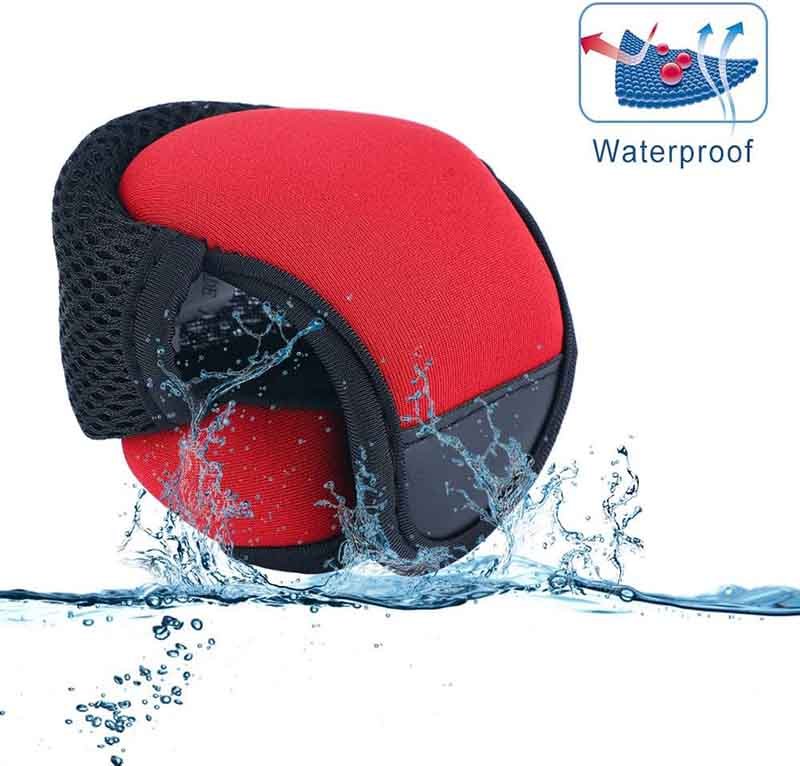
Neoprene fishing reel covers come in multiple styles: standard slip-on covers for basic protection, heavy-duty waterproof covers for harsh conditions, and customized OEM/ODM covers with logos and branding for retailers or private labels. Each type caters to different anglers, from casual weekend fishers to professional charter operators.
The market for neoprene fishing reel covers has grown significantly in the past decade, as anglers demand better protection for increasingly expensive gear. Entry-level reels might cost US$50–100, but high-end baitcasters or spinning reels easily exceed US$300–600 per unit. That investment drives the need for quality protection.
Here’s a classification table summarizing common reel cover types:
| Type | Typical Thickness | Target Users | Price Range (USD) | Customization Options |
|---|---|---|---|---|
| Standard Slip-On Covers | 2–3 mm | Recreational anglers | $1.5–3 | Limited logo printing |
| Heavy-Duty Waterproof Covers | 4–5 mm + seam-sealed | Offshore & saltwater anglers | $3–6 | Colors, logos, stitching options |
| OEM/ODM Custom Covers | 3–5 mm | Retailers, private-label brands | $2.5–5 (bulk MOQ 300+) | Full branding, packaging, labeling |
- Standard Slip-On Covers: These dominate platforms like Amazon and Walmart, offering basic scratch and dust protection. Brands like PENN and Shimano provide affordable variants around $2–4 each for spinning or baitcasting reels.
- Heavy-Duty Covers: Designed for saltwater or extreme-weather fishing, these often feature seam-sealed stitching, thicker neoprene, and reinforced closures. Okuma and Daiwa sell such covers with UV resistance and extra padding.
- OEM/ODM Custom Covers: For retailers and distributors, Szoneier offers private-label covers with silk-screen logos, embroidery, or heat-transfer prints. Buyers can customize thickness, size, color, and even retail packaging—perfect for building brand identity.
From a critical perspective, while generic covers meet basic needs, OEM/ODM covers elevate market competitiveness by offering branding opportunities. For example, small fishing gear startups often rebrand Szoneier’s covers with their logos, creating a professional product line without heavy upfront investment.
How to Choose the Right Neoprene Fishing Reels Cover for Your Needs?
Choosing the right cover depends on reel size, fishing environment, material thickness, and budget. Offshore anglers need heavy-duty 5 mm covers, while freshwater or casual users may prefer lighter 2–3 mm options. Custom branding suits retailers and private labels aiming to build product identity.
When selecting a neoprene fishing reel cover, consider four main factors:
- Reel Size & Type:
- Spinning reels typically need wider covers, while baitcasting reels require snug-fitting designs with cutouts for handles.
- Oversized saltwater trolling reels demand heavier, full-coverage models.
- Material Thickness & Protection Level:
- 2–3 mm neoprene: Lightweight, easy to pack, suitable for freshwater or low-impact use.
- 4–5 mm neoprene: Heavy-duty, shock-absorbing, ideal for offshore fishing where gear faces harsh conditions.
- Fishing Environment:
- Saltwater: Corrosion is the enemy. Look for covers with water-repellent coatings and reinforced seams.
- Freshwater: Lighter covers suffice, though UV protection still extends lifespan.
- Customization & Branding:
- Retailers and distributors often need logo printing, embroidery, or retail-ready packaging. Szoneier offers low MOQs (300 units) and free design support for private-label orders.
Here’s a quick recommendation matrix:
| Fishing Style | Neoprene Thickness | Cover Type | Approx. Cost per Unit |
|---|---|---|---|
| Weekend Freshwater | 2–3 mm | Standard Slip-On | $1.5–3 |
| Offshore Saltwater | 4–5 mm + seam-sealed | Heavy-Duty Waterproof | $3–6 |
| Retail/OEM Branding | 3–5 mm | Custom Logo & Packaging | $2.5–5 (MOQ 300+) |
Do Neoprene Fishing Reels Covers Really Extend Reel Lifespan?
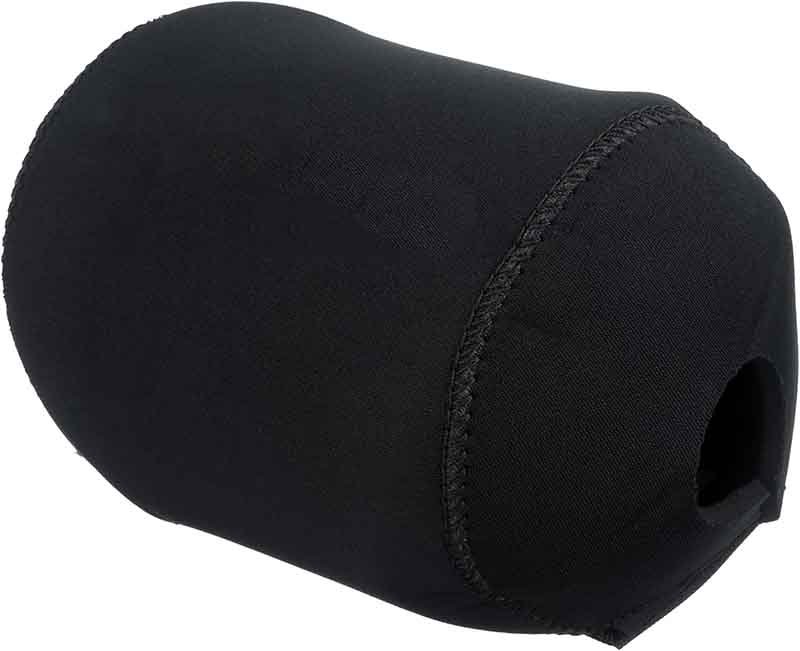
Yes. By shielding reels from saltwater corrosion, dust, and physical impact, neoprene covers reduce wear on gears, bearings, and finishes, prolonging reel lifespan and lowering maintenance costs for anglers.
Saltwater exposure is the leading cause of fishing reel degradation. Studies from Salt Strong show that unprotected reels used in saltwater environments require 30–50% more frequent maintenance and have 20% shorter service life compared to protected reels.
Neoprene covers help in three major ways:
- Corrosion Prevention:
- They shield reels from direct salt spray, reducing oxidation on metal surfaces and bearings.
- Physical Protection:
- Prevent scratches when transporting gear in car trunks, boats, or tackle bags.
- Dust & Debris Reduction:
- Sand, dust, and small debris scratch anodized finishes or jam reel handles; covers block such contaminants.
Data Comparison Table:
| Condition | Without Cover | With Neoprene Cover |
|---|---|---|
| Salt Spray Exposure Damage | High | Low |
| Reel Bearing Lifespan (Hours) | 500–700 | 900–1200 |
| Maintenance Frequency (Per Year) | 6–8 | 3–4 |
| Resale Value After 3 Years | 40–50% | 65–70% |
From a practical standpoint, professional fishing guides using custom-logo neoprene covers report not only longer reel life but also enhanced brand visibility when clients see branded gear in action—a marketing edge beyond functional benefits.
Is Neoprene Better Than Other Materials for Fishing Reels Covers?
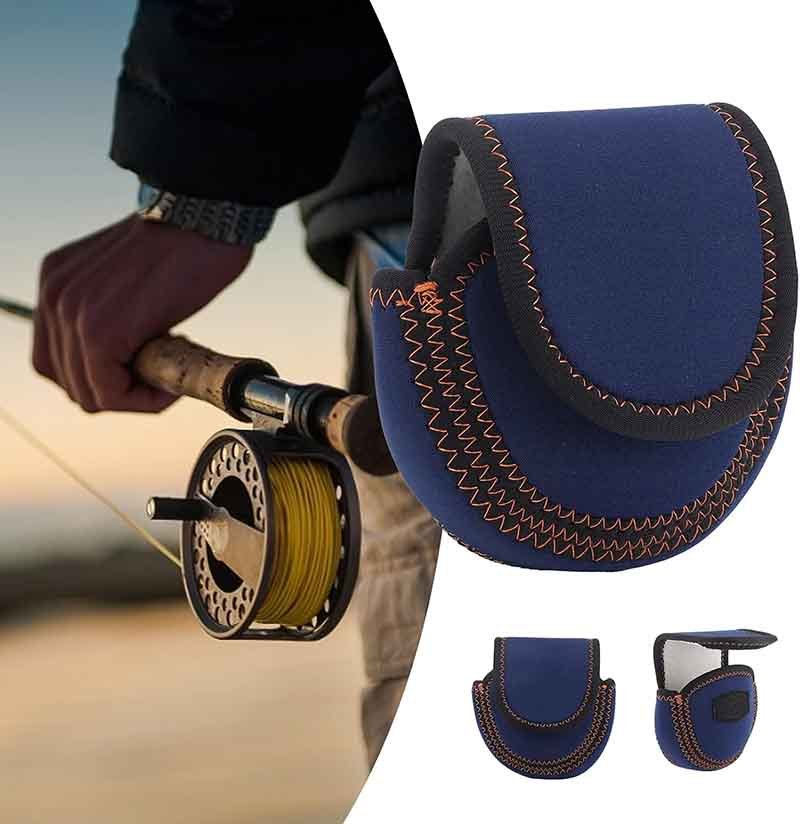
Neoprene outperforms polyester and rubber in water resistance, flexibility, and cushioning, making it the preferred material for reel covers. Polyester is cheaper but lacks impact protection, while rubber offers durability but less flexibility and higher weight.
A material comparison highlights why neoprene dominates this niche:
| Material | Water Resistance | Impact Protection | Flexibility | UV Resistance | Cost |
|---|---|---|---|---|---|
| Neoprene | Excellent | High | High | Moderate | $1.5–6/unit |
| Polyester Fabric | Moderate | Low | Moderate | Low | $1–3/unit |
| Rubber (PVC/NBR) | High | High | Low | High | $3–8/unit |
- Neoprene: Strikes a balance between softness (to avoid scratches) and durability (to resist tears and water ingress).
- Polyester: Lightweight and cheap but absorbs water, offering little impact protection.
- Rubber: Waterproof but stiff and heavier; lacks the snug fit anglers prefer.
From a branding standpoint, neoprene’s smooth surface enables high-quality logo printing—key for retailers seeking premium product presentation.
Are OEM and Wholesale Options Available for Neoprene Fishing Reels Covers?
Yes. Szoneier offers OEM/ODM manufacturing with low MOQs (300 pcs), free design support, fast sampling (3–7 days), and bulk production (25–35 days), enabling retailers and private-label brands to launch custom reel covers affordably.
Retailers face three common challenges sourcing reel covers:
- High MOQs from traditional factories
- Slow sampling cycles delaying market launches
- Inconsistent quality across batches
Szoneier’s OEM/ODM Advantages:
- Low MOQ: Starting at 300 pcs per style/color
- Rapid Sampling: 3–7 days for prototypes with logo printing
- Bulk Production: 25–35 days standard lead time; rush orders available
- Certifications: ISO9001, ROHS, REACH compliance for EU/US markets
Case Study:
A Florida-based fishing gear startup ordered 500 custom neoprene reel covers with silk-screen logos. Szoneier delivered samples in 5 days, full production in 28 days, enabling the brand to launch on Amazon before peak season—beating competitors by 6 weeks.
How to Source Quality Neoprene Fishing Reels Covers from Reliable Manufacturers?
Look for factories with OEM/ODM capabilities, ISO certifications, low MOQs, and fast sampling. Check production capacity, material quality, and shipping support to ensure on-time delivery and consistent quality.
Reliable sourcing requires evaluating:
- Production Capacity: Szoneier operates 20+ production lines with monthly output of 50,000+ covers.
- Quality Assurance: 100% in-house inspection before shipment.
- Shipping Flexibility: Sea, air, rail, and door-to-door DDP options available.
Checklist for Buyers:
- Factory certifications (ISO9001, REACH)
- Sample approval process
- Lead time transparency
- After-sales support & defect handling
Conclusion
Neoprene fishing reel covers are no longer optional—they’re essential gear protection for anglers and branding opportunities for retailers. With Szoneier’s 18+ years of expertise, custom OEM solutions, and low-MOQ manufacturing, you can launch private-label reel covers with professional quality and fast delivery.

